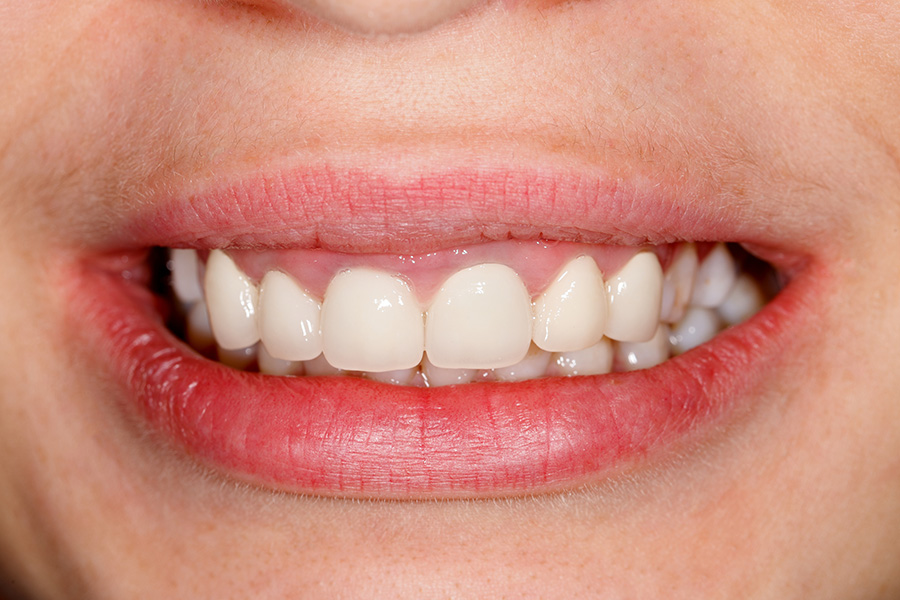It may already be obvious you have chipped, cracked, or damaged teeth. Your kids may have already pointed it out, pushing you to see a dentist for the pain. Or you could be self-conscious about the way your coworkers and clients look at you when you smile.
Dental crowns are an excellent solution to these oral health issues and help you feel confident around your family and workplace. And porcelain crowns could be the specific type you need to repair tooth damage that could develop into something worse.
They mimic the look of natural teeth and are practically invisible to others that aren’t aware. Tooth decay in your back or front teeth will look like healthy teeth in the end, and a dental office can finish crowns with a quick turnaround.
If you want to learn more about porcelain crowns, the types of dental crowns, and how they can help restore your brilliant smile, we’ve answered all your questions here.
What is a Porcelain Crown?
Porcelain crowns, sometimes referred to as ceramic crowns, are caps or covers that dentists bond over the top of an existing tooth. Whether it’s damaged or decayed, they can protect your teeth from further damage.
A dental professional will cement the porcelain crown into your mouth and match its color with your other teeth. It is a cheaper oral health option than implants and can boost your self-confidence.
They are one of several types of crowns and among many dental solutions for improving your tooth’s look and function. And you can get a porcelain crown done to your damaged tooth and not even notice the difference.
Difference between Porcelain Crowns and Veneers
Porcelain crowns differ from porcelain veneers in that they create a cap over the entire tooth to protect damage underneath.
Oral professionals typically use veneers for cosmetic purposes and do not strengthen the tooth beneath. They only cement them to your front teeth, meaning veneers cannot strengthen vulnerable molars.
While shiny white teeth may be your goal with an office visit, the dentist may recommend the option that prioritizes your overall health. They fear you losing teeth and spending thousands down the road on dental services you don’t need.
What are the Different Types of Crowns?
Dentists can make crowns from several different materials, such as ceramics, porcelain-fused-to-metal crowns, and metal alloys (gold and base). Depending on what you’re looking for, they can fit you with the correct crown.
Some options like base metal alloy crowns don’t match your tooth’s natural color and others can notice them easily. And your budget may not afford a fragile crown that could break quicker than others.
An oral professional may recommend different tooth solutions based on your unique circumstances. They will help you achieve a beautiful smile while taking into account your mouth’s health.
| Porcelain | Porcelain-fused-to-metal | Gold Alloy | Base Metal Alloy |
| Most popular | Mix of aesthetic & strength | Status symbol | Strength |
| Front teeth | Front teeth | Front or back teeth | Back teeth |
| Fragile | Fragile | Durable | Durable |
| Natural teeth color | Silver | Gold | Silver |
| Cheap | Cheap | Expensive | Cheap |
How Much do Porcelain Crowns Cost?
While porcelain crowns run less than gold alloy crowns, they still cost more money than you may expect. Your specific brand and dentist will determine the price, but they run between $800 to $3,000 in most cases.
Repairing a porcelain crown will cost less and dental insurance will help cover how much you pay. We recommend calling your local dentist office or checking their website to see whether they take your particular carrier.
What is the Procedure for Installing a Porcelain Crown?
Most offices can fit your crown in 2 visit sessions and get you smiling perfectly again in no time.
Your dentist will determine your oral health needs, often completing x-rays to assess the extent of the damage during the first visit. Also, they will also take a mold of your tooth in this assessment that will be used to create your dental crown.
After getting a mold, your dentist will then complete any necessary procedures before capping off the tooth, such as removing decay with a root canal or completing any small or large fillings needed. The medical professional will fit you with a temporary crown in most cases while you wait for a permanent crown.
The final visit is for crown installation, which involves a dentist bonding the cap over your existing tooth with a strong adhesive. Their job is to ensure the fit is snug and does not impede your bite or chewing capabilities or dig into your gum line.
Is the Procedure Painful?
No, you should not feel any pain when receiving a porcelain crown. Your dentist will use a local numbing agent or anesthesia when completing any dental work for crown installation.
You may feel a slight pinch during the procedure or some discomfort and soreness during recovery, but these sensations should disappear within a day or so.
If you feel soreness, discomfort, or pain in the days after your procedure, or if you experience difficulty chewing, you should contact your dentist to ensure that the fit is proper and you are not having an adverse reaction.
How do I know if I need a Porcelain Crown?
If you suffer damage to a tooth, you should see a trusted dentist as soon as possible to ensure that no further damage occurs. Your dentist will be able to assess the situation and give you the best advice for your particular case.
They could recommend you for a dental implant or dental bridge depending on the damage and provide a more permanent fix to your tooth.
Likewise, an oral professional can spot any other tooth decay or issues that could cost you thousands down the road. They can educate you on dental health, learn more about your goals for aesthetically-bright teeth, and explain how to meet those goals.
Our All-In-One Dental Professional
Dr. Nathan Smith has unique expertise in crowns, implants, and other procedures that would normally require an orthodontist. We can do most of your oral health in-house without sending you to a specialist that charges an arm and a leg.
Call today at (480).838.3033 to schedule a visit with our dental professionals and ask any questions about the procedure and dental crowns cost. We look forward to assisting you.

